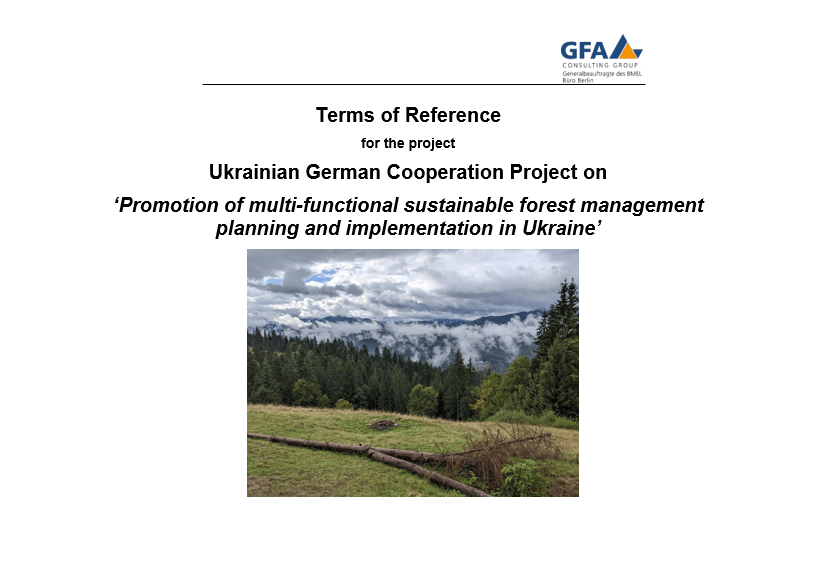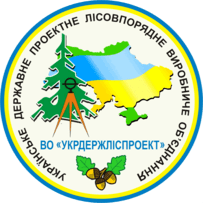Since October 2021 the SFI Project supports Ukraine in the development of legal requirements and the implementation of a robust National Forest Inventory (NFI) to be used as a base for strategic state forest management and policy decision making. Despite the ongoing war by Russia, remarkable results have been reached by Ukrainian experts, namely a Remote Sensing based Forest Inventory was successfully implemented, which provides outputs in the form of per-pixel estimates of key forest inventory characteristics across Ukraine (RS-Inventory – nfi.lisproekt.gov.ua).
As the SFI-Project enters now into a new three-years project phase representatives of forest policy institutions, forestry administration, state forest management, forestry science and international organizations have been invited 05.12.2024 to present selected outputs of the recent project phase as well as to inform about the new phase of the SFI-Project. About 50 experts followed the invitation.
In his opening speech Vice Minister, Oleksandr Sements, Ministry of Environmental Protection and Natural Resources of Ukraine (MEPR) thanked the Federal Ministry of Food and Agriculture of Germany for its persistent assistance, established since 2018. “The SFI-Project consulted on fundamental requirements for NFI such as normative regulation, state financing and organisational setup, which finally led to the setup of Centre of National Forests inventory of Ukraine (CNFI). Considering the ongoing war caused by Russia invasion of Ukraine special support was provided to overcome losses and damages of forest inventory capacities as well as to field data gathering for NFI. Together with the project Ukrainain experts implemented an remote sensing based forest inventory for the whole country, including currently occupied territories. The Ministry indorses the planned new SFI-Project phase, particularly with regard to sustainable, multifunctional forest development according to requirements related to EU accession of Ukraine.
On behalf of the German government, Thomas Baldauf, Federal Ministry of Food and Agriculture of Germany, referred to the ongoing war by Russia in Ukraine and confirmed further technical assistance by Germany in the area of sustainable forestry and in doing to support of Ukraine on its way to European integration. He noted that remarkable results have been achieved with regard to NFI through an in depth collaboration of Ukrainain and German experts in the framework of the SFI-Project. Efficient collaboration is futher needed in the new SFI Project phase, directed to forest policy advice, consultancy on forest management planning and state forest management. Further Baldauf mentioned a variety of other forestry projects supported by Germany, being implemented particularly in the framework of FAO.
Ihor Budzinskyi, Head of Department of Forestry and Forest Restoration of the State Forest Resources Agency mentioned during his brief intervention that SFI-Project consultancy on forest policy was provided according to the concrete needs, related to EU accession process of Ukraine. He expressed his wish to follow up the same way during the upcoming next phase of the SFI-Project.
In next section of the event selected SFI-Project outcomes have been presented.
First, Dirk-Roger Eisenhauer, Head of the Competence Centre for Forest and Forestry, Saxony reported about his commenting on forest policy regulations in Ukraine, which was build up on an analysis elaborated by the Law firm: “OLEG STORCHOUS”. With regard to implementation of Environmental Impact Assessment (EIA) Eisenhauer drew the conclusion that Ukraine should rather focus on the minimum standards of the Directive 2011/1992/EU, not extended EIA to regular forestry measures and that any EIA requires sufficient structures and instruments for sustainability control by the forestry administration. With regard to the high share of clear cuttings, Eisenhauer pointed to the economic incentives and recommended a review of state forest management decision making, taking natural oriented forestry approaches into account. “It seems essential that the regulatory framework allows the condemnation of mass reproduction of bark-breeding insects in their initial phase”, said Eisenhauer.
Afterwards, Viktor Myroniuk, Professor, Forest Mensuration and Forest Management Department of National University of Life and Environmental Sciences of Ukraine presented key outcomes of the recently implemented RS-Inventory of Ukrainian forests. The RS inventory revealed a total forest area of 11.2 million ha, or 18.6% of the total area of Ukraine, of which 1.7 million ha was temporarily occupied by Russia or affected during the war. Taking the impact by the Russian war into account, remotes-sensing based forest inventory (RS-Inventory) seems the only trustworthy technology to assess forest of Ukraine comprehensively, in the framework of limited NFI state budget. As an example, Viktor Myroniuk mentioned the data prepared in the SFI project helped to identify about 67 thousand hectares with various degree of forest cover damage between 2021 and 2023 within the war zones. Currently an additional structuring of RS-Inventory results by (i) legal definitions, by (ii) levels of protection and by (iii) owner respectively user groups is in preparation, provided that required maps will be made available. The RS-Inventory requires adaptation of NFI regulations, where the coming SFI-Project phase might consult on as well as sufficient state financing, particularly for field data collection as a contribution to the further increase accuracy of the RS-Inventory.
Next speaker, Vitaliy Storozhuk, National Coordinator of SFI-Project, talked about an “Analysis of NFI ecological parameters: where is forest monitoring going ahead?”, where he showed the potential of NFI field data to contribute to forest biodiversity assessment. “The challenge is to expand the role of the NFI as a single platform for a sustainable, transparent, comprehensive state system of forest monitoring, with a focus not only on timber, but also on the ecological status of forests in all their multifunctionality, taking increasing risks for forests into account. Such a monitoring is of essential importance for robust strategic national forest policy decision making and harmonisation to EU forest monitoring”, said Storozhuk.
Finaly in this section, a new “Concept of NFI development: legislative and methodological aspects”, was presented by Andriy Shamrai, Head of CNFI of the Ukrainian State Forest Management Planning Association. Shamrai stressed the extreme shortages in state financing for NFI. The currently developed hybrid inventory, consisting out of analysis of field data to calibrate satellite images is proposed as the most suitable technology, which would require a budget of 12 million UAH/year. “As NFI is an essential basis for strategically oriented sustainable forest management it requires sustainable state financing, whereas international cooperation will allow to benefit from European experiences“, concluded Shamrai.
Viktor Melnychenko, General Director of Ukrderzhlisproekt, thanked the German government for provided support and expressed his interested in the follow up of SFI-Project in the area.
Syman Jurk, IAK Agrar Consulting, SFI-Project Operational Backstopper informed briefly about the upcoming new phase of the SFI-Project, which is titled “Promotion of multifunctional sustainable forest management planning and implementation in Ukraine”. The objective of the project is to “Establish multifunctional sustainable forest management policy framework aligned with EU policy requirements in Ukraine”. He described roughly some of the expected outputs, e.g. the Timber Supply Outlook Study for Ukraine structured by various forest management scenarios. He presented the so called Forest Policy Advisory Group, which was established in order to monitor SFI-Project implementation by technical experts. Further Jurk listed the project activities planned in 2024 and drew attention to some important requirements, such as the supply of information and data for SFI-Project analytical work as well as the SFI-Project registration.
During the discussion various issues have been raised, among others related to:
- Climate change and adaptation of forestry
- Transparent access to RS-Inventory results
- Provision sufficient state financing for NFI respectively RS-Inventory
- Increase efficiency of sate forest management
- Streamline forest legislation to public needs in forestry
- Put emphasis on forest conservation in a close to nature manner
- Use the potentials of space born LIDAR based technologies for NFI
Volker Sasse, SFI-Project Leader, thanked all speakers and participants for their input to the current event and collaboration to the sake of sustainable multifunctional forest management in Ukraine.
Presentation RS-Inventory of Ukrainian forests: Methodology and Major Outcomes
Presentation Analysis of the environmental parameters of the NFI: How forest monitoring is developing?
Presentation Concept of further development of the national forest inventory of Ukraine

